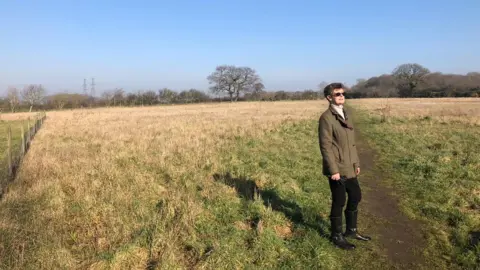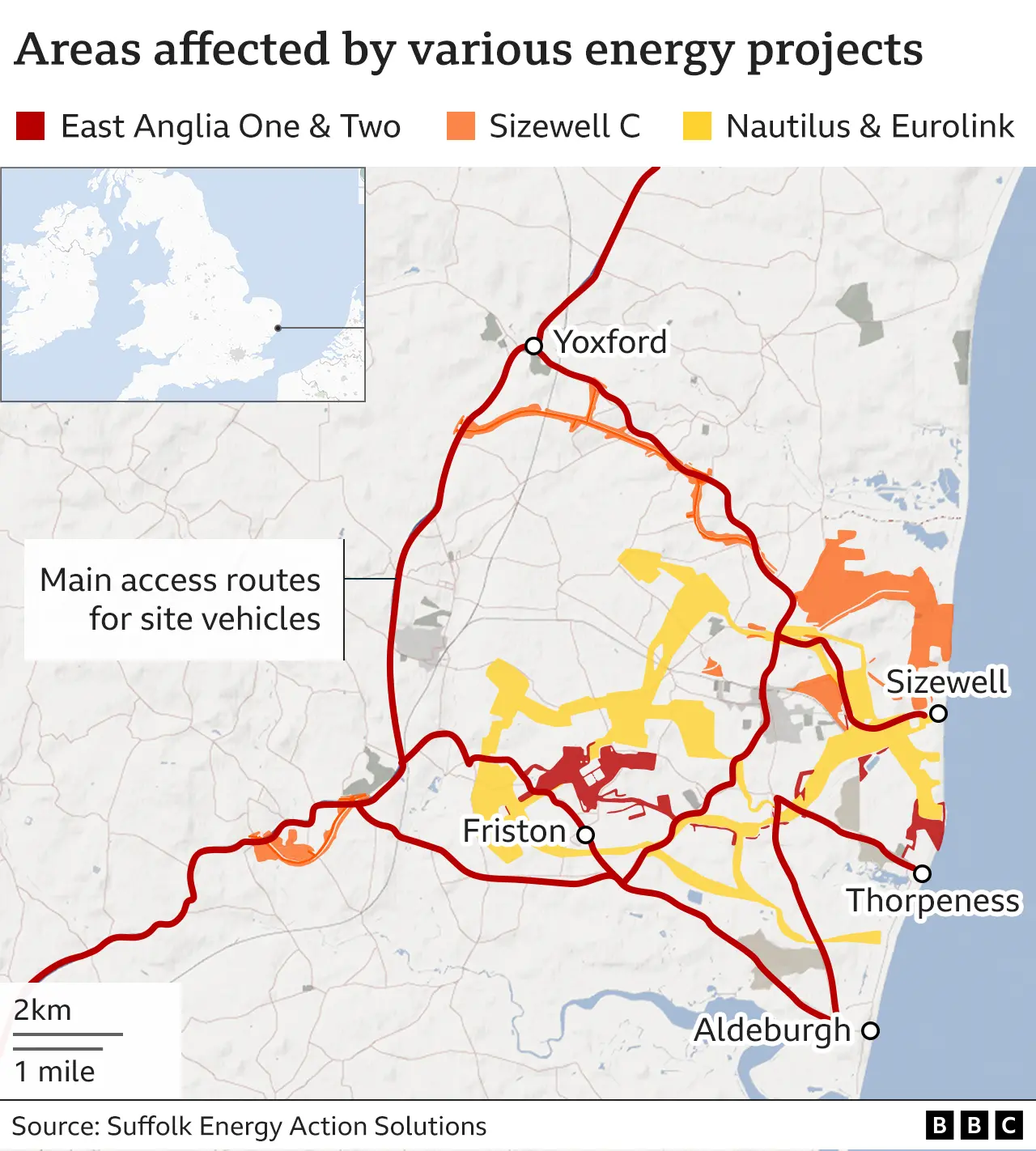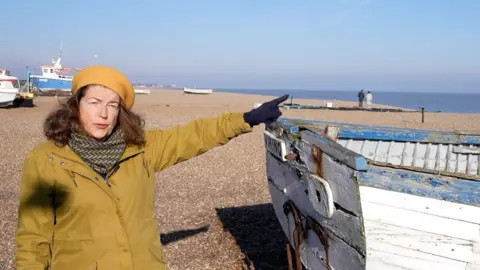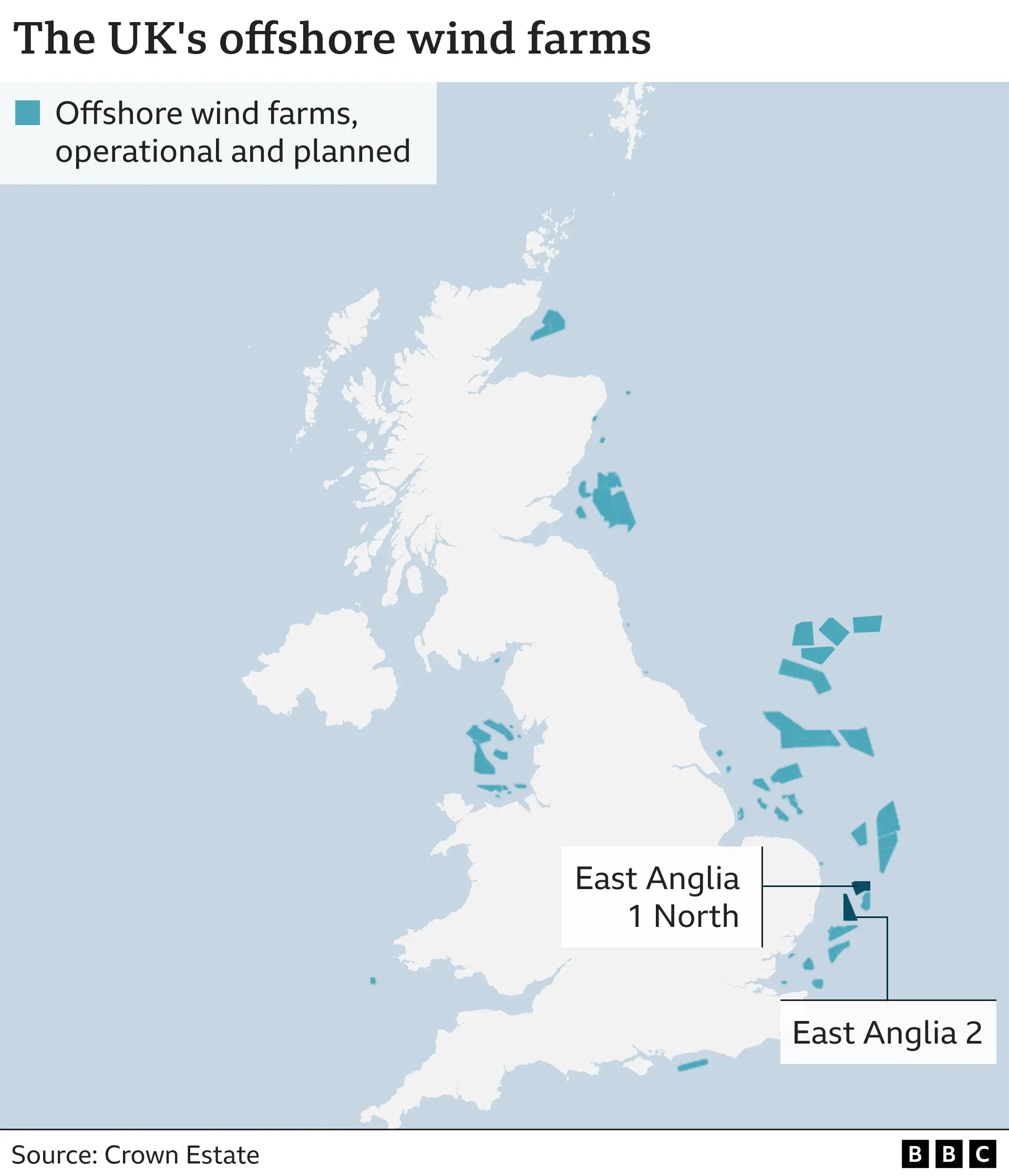Green energy revolt threatens Tory support in minister's backyard
Along a beautiful stretch of England's east coast, an ugly dispute is exposing the problems inherent in building the country's future energy system.
The wind farms to be erected in the North Sea are vast in scale and will one day generate enough power for 1.5 million homes.
They are central to the government's push to hit climate targets and lower energy bills.
But to get the power from the new turbines into the national grid, a sprawling complex of cables and electrical facilities need to be built in a picturesque area of Suffolk.
Some locals are furious, fearing "a devastating cumulative economic, social and environmental impact" - and they predict a political backlash at council polls in May and the next general election, with support for Tory councillors and local MP, Therese Coffey, threatened.
There are versions of this bust-up across England, as Tory MPs struggle to balance government policy on net zero with the demands of constituents. For Environment Secretary Ms Coffey, it's a particularly awkward dilemma.

"If you look to the left here, there's a fence with posters. That's my house."
The house belongs to a resident of Aldeburgh, where the posters depict a village under siege by a "threatened onslaught" of energy projects.
At the centre of this web of projects are two offshore wind farms approved by the government last year - East Anglia One North (EA1N) and East Anglia Two (EA2). To deliver the power they generate, the developer, ScottishPower, plans to bring cables onshore near Aldeburgh.
The cables would weave underground towards a large industrial site known as a substation, where electricity can be transmitted further inland.
Elizabeth Thomas says the 14m-high substation "will dwarf" Friston, the medieval village next door. Fearing traffic congestion, flood risk and the loss of farmland, the former teacher has been campaigning to move the substation elsewhere.

Adam Rowlands is similarly dismayed by separate National Grid plans.
National Grid wants to develop two major electricity links - Sea Link between Suffolk and Kent, and EuroLink between the UK and the Netherlands.
As Suffolk area manager for the RSPB, a wildlife charity, Mr Rowlands is responsible for overseeing North Warren, a marshy nature reserve teeming with ducks, swans and geese.
As we arrive at the reserve, a gaggle of geese swoop across the path of proposed underground cables, which Mr Rowlands says would "damage" the site and drive away birds.
Addressing these concerns, National Grid tells us "we give very careful consideration to all environmental and community impacts".
In the government's view, these projects are necessary to secure cleaner, cheaper power and end reliance on dirty, more expensive fossil fuels.
Campaigners like Fiona Gilmore couldn't agree more - with one exception.
The campaign she leads, Suffolk Energy Action Solutions, says much of this energy infrastructure should be put offshore on platforms connected to a single onshore hub at a disused site, closer to London.
She says this offshore grid system would be cheaper and has already been used by Belgium.


When we put this proposal to Mike Elmer, east coast programme director for National Grid, he said moving the onshore infrastructure elsewhere would pose significant practical, cost and time challenges.
He said while National Grid continued to review offshore islands, infrastructure has to come onshore somewhere to deliver clean energy.
Conservative councillor Craig Rivett, deputy leader of East Suffolk Council, says those suggesting alternative solutions, such as an offshore grid, needed to be clear about the "technical, legislative and economic consequences to those proposals".
"There is no silver bullet for us achieving energy security as a county and net zero," he says.
The debate has pitted campaigners against energy developers, with Suffolk Coastal MP, Ms Coffey, sandwiched between them. In a petition, the environment secretary has called for a review of all onshore energy connections on the Suffolk coast.
"But if we don't get the offshore grid, and if this area is ruined, trust me, I think she's going to lose a lot of Conservative voters," Ms Gilmore says on Aldeburgh beach.
"Too right," says a passing dogwalker, eavesdropping on our interview.
The sentiment is shared by Tony Bone who, as the chairman of Aldeburgh Museum, fears a huge downturn in tourism if the energy projects go ahead as planned.
"Suffolk Coastal has been a Conservative heartland," Mr Bone says. "But I think people are changing their minds."

In a statement to the BBC, Ms Coffey - who has a majority of over 20,000 - said she had been "engaged in these issues from the very beginning" and had "consistently made it clear that it's essential our precious landscapes and communities are protected by placing the infrastructure in the appropriate location".
Ms Coffey said onshore connections should be placed on brownfield land and she would "continue to press this point with National Grid and energy ministers".
She said she was "disappointed" her colleague, the climate minister Graham Stuart, hadn't yet committed to a full review of these projects.
In a letter to communities in Suffolk last month, Mr Stuart said he didn't think a review was the way forward, as the government couldn't "force changes" to projects with contracts. Instead, he said his department was encouraging "voluntary co-ordination" of projects.
There are still legal hoops to be jumped through as well. Last month, a legal challenge against the decision to approve the EA1N and EA2 windfarms was granted permission to be heard in court.
With local and national elections on the horizon, MPs and councillors are attuned to the political costs of these projects, as councillors say they expect the Tories to lose seats on East Suffolk Council in May.

Back on Aldeburgh beach, Ms Gilmore says: "I think that the whole of East Anglia is now up in arms."
"Suffolk, Norfolk, Essex - it's not just us. And we're not NIMBYs, we're actually progressive, forward-looking people."
In a message to Conservative MPs in the region, she says: "With a general election coming up, they've got to start listening to us - now."
Video journalism and additional reporting by Thomas Mason.
